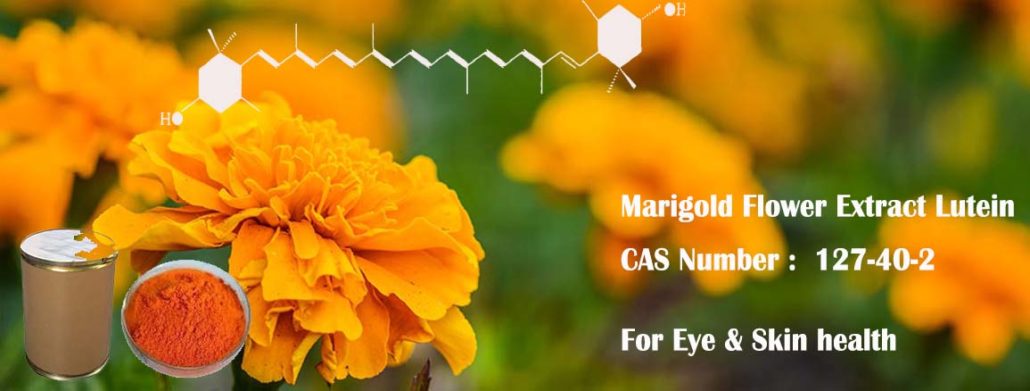Lutein supplement for people health
Lutein (CAS NO: 127-40-2), nicknamed “the eye vitamin”, is a naturally occurring carotenoid vitamin, it is mainly used by people as an eye health supplement. Lutein supplement has been widely recognized by the medical community and consumers worldwide because of its excellent eye care effect. Therefore, lutein has been one of the standard formula products for eye health. Until now, lutein still occupies an important position in the global eye care functional food and nutritional supplements market.

The data from Markets and Markets shows that lutein market was valued at USD 249.7 Million in 2016 and is projected to reach USD 357.7 Million by 2022, growing at a CAGR of 6.3% from 2017. In terms of volume, the market is projected to reach 2,121.2 tons by 2022. The main driving factors of the lutein market is consumer concerns about age-related diseases, such as macular degeneration. However, more new research shows that lutein has applications in other health fields as well, such as brain health, sports nutrition, skin health and sleep management, and these new discoveries will attract more consumers from different groups to pay attention to lutein supplement.
Yellow spots are part of the retina that is responsible for eye vision, but if they are continuously exposed to high-intensity light, especially light with a blue wide-spectrum wavelength, they are vulnerable to photo-oxidative damage. Lutein and zeaxanthin, also known as macular carotenoids, play an important role in eye health. First, the eye free radicals caused by photo-oxidation will be neutralized, and then, they can filter out the high-energy blue wave light with great damage. Basing on this fact, the eye can be protected by increasing the content of carotenoids in the yellow spot of the eye.
A long-term survey conducted by the National Institutes of Health found that the number of cataracts and age-related macular degeneration (AMD) among people aged 50 and older in the United States reached 2.1 million, at the same time, the incidence rate of people over 80 years old is 1/10. Age-related eye disease study 2 (AREDS2) found that the subjects who took low amounts of lutein and zeaxanthin in the diet can reduce age-related macular degeneration (AMD)’s risk of deterioration by 26 %. Basically in this study, the dosage of Lutein and zeaxanthin that the National Institutes of Health recommended are 10mg and 2mg, and the research results shown that compared with those who did not took lutein and zeaxanthin, the people who supplement lutein and zeaxanthin have a lower risk of deterioration in cataract and cataract surgery.
Blue light is everywhere in our daily life, from electronics products(such as laptops, televisions, mobile phones) to LEDs and energy-saving fluorescent lamps , long-term exposure to blue light can cause eye damage, especially in the retina . Research shows the higher the content of macular pigment optical density (MPOD, which can be described as a mixture of lutein and zeaxanthin), the stronger its effect against blue light.
Besides for eye health, what is other benefits from Lutein supplement ?

One of the reasons that lutein has continued to concern closely in scientific research for many years is that its health effects have been confirmed by clinical research, brain health is one of them. In recent years, the study of lutein in the brain has been very hot, for example, the link between MPOD(macular pigment optical density) and time processing speed can be used as a marker of central nervous system health. The proximity of retinal tissues, optic nerves, and brain tissues partially determines that lutein can protect the eyes while also improving brain health.
A number of studies from primates, children, middle-aged people and the elderly have shown that lutein plays an important role in brain health. A study published in 2017 by Nutrients magazine pointed out that baby formula containing lutein can selectively increase the content of carotenoids (lutein) in the brain of rhesus monkeys, and the visual processing center of occipital cortex has the highest level, while lycopene and zeaxanthin were not detected in the brain. Among carotenoids, lutein is preferentially deposited in infants’ brain and retina, and it plays an important role in the growth and development of these tissues. In addition, lutein has antioxidant and anti-inflammatory effects both inside and outside the body. Considering the risk of oxidative stress in infants and young children, lutein has important significance in the early life process.
A study by the University of Georgia in 2017 found that Lutein and zeaxanthin help promote brain health in the elderly. The researchers indicated that Subjects with higher lutein and zeaxanthin levels in the body need only a small amount of brain activity to recall early words and phrases, which means that the participants ‘nervous system is more effective. Another study also showed Lutein supplement can significantly increase brain-derived neurotrophic factors (BDNF), a protein that participates in neuroplasticity. It can grow and differentiate neuronal cells, improve learning, memory and cognitive function.
Lutein at the macula lutea can protect the eye from photo-oxidation, and lutein deposited on the skin has a similar effect on skin health. A study that 10mg Lutein supplement daily for 12 weeks , and the result shown that skin health was significantly improved, such as increased skin color, brightness, elasticity, and the minimal erythema dose (MED), higher MED levels means greater protection for the sun
Lutein is a rookie in skin health market, what its unique is that it can solve the skin color and sun protection problems that people face, which also conforms to the development trend of the beauty of the internal and external markets.


